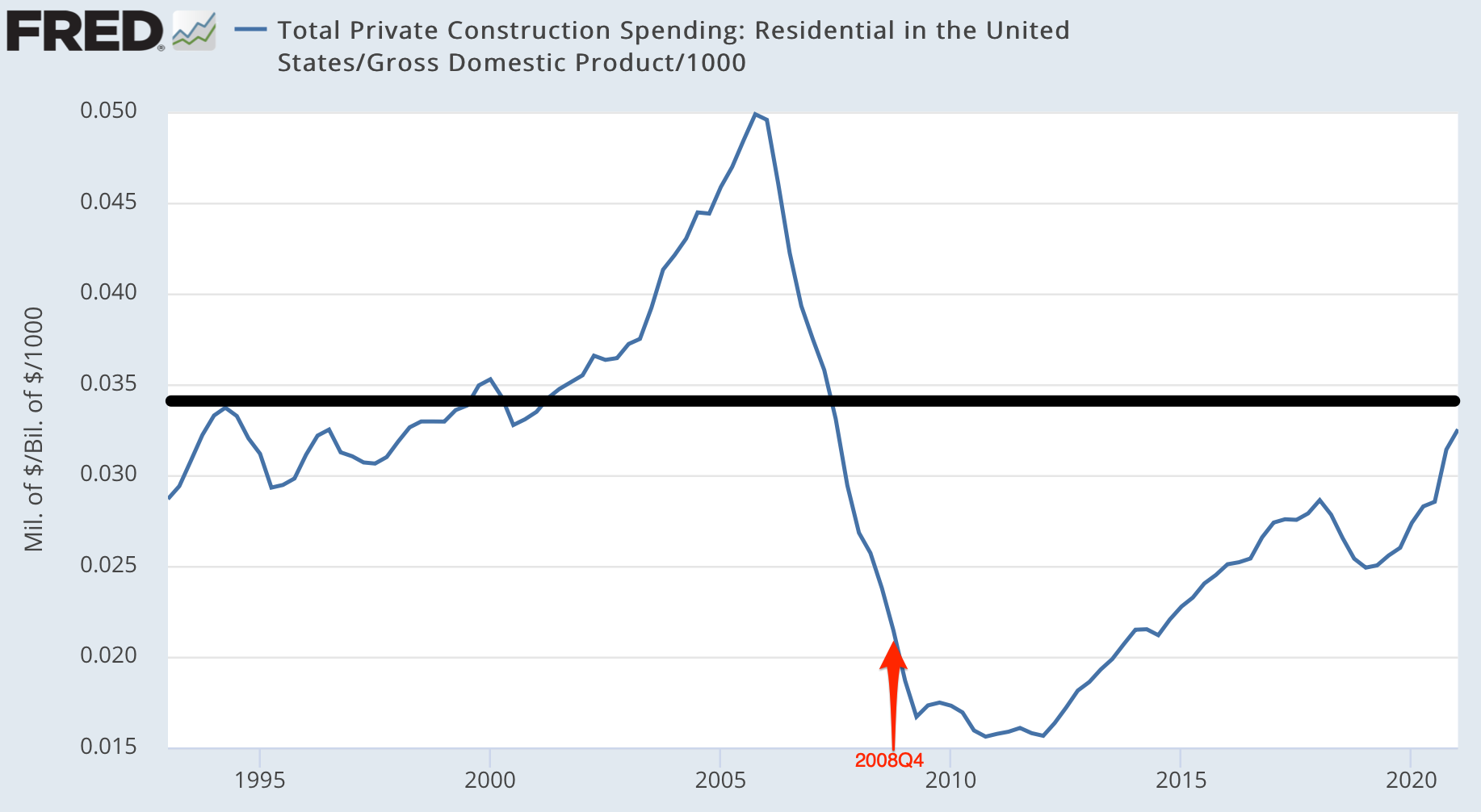|
This is your new edition of Grasping Reality—The SubStack Newsletter,
by Brad DeLong:
Things that went whizzing by that I want to
remember...
Subscribe now
First:
A Non-Socratic Dialogue:
Milton Friedman’s Influence Kept Right-Wing
Economists from Reverting to Full Crazed Liquidationist Nutjobs for 60 Years.
But Why Did It Then Decline So Fast in the Decade of the 2000s?
Claudia Sahm:
"We should have a
recession,” John H. Cochrane said in November [2008], speaking to
students and investors. “People who spend their lives pounding nails in
Nevada need something else to do.” #yikes <https://t.co/vbSKhIRMtR> by @delong <https://braddelong.substack.com/p/reading-john-lippert-on-the-idiocy>
Scott Gosnell: I was
there. I may even have a recording down in the archives and may have sprained
my eyes I rolled them so hard.
Brad DeLong: What!
Really? Tell me more…
I mean, private housing construction as a share of GDP had crashed
from its peak of 5.0% of GDP in 2005Q4 through its historical average of 3.4%
in 2007Q2, and had bottomed all the way down to 2.1% by 2008Q4, when Cochrane
was opining about too many people pounding nails in Nevada:
How was it possible to say such a thing? How could he
avoid looking at graphs like this one, and noticing that residential
construction employment had already fallen from 150% to 60% of its normal
share even as he spoke?
And how did the audience react?
Joe Marshall: Holy
hell. What the f—- was wrong with these people?
Scott Gosnell: I
went to all of those econ talks at Gleacher while I lived in Chicago. The
noticeable thing about Cochrane was that he was very good at financial
economics, but fell apart when he tried to jump to macro. But of course
faculty could say all kinds of things without getting much skepticism. Being
a Mellon-style liquidationist was sort of edgy and cool among the
Republican-leaning economists at the time.
Brad DeLong:
Touché... One question I always ask Paul Krugman and company is: what
happened to the influence of Milton Friedman? No one was a stronger
anti-liquidationist than Milton Friedman.… The shift to
"liquidationism" as the default policy view of a Republican economist
(when Republicans were out of power, at least), seems to have happened
remarkably quickly in one decade, the 2000s, and without analysis and without
argument. How and why did this happen, that being a full-fledged Mellonian
became "edgy" and "cool"?
Scott Gosnell: I think
it came swift on the heels of a Randian political moment. Where before,
Austrian economics would get you a glance askance, in 2008, it would get you
a $300+ bottle of wine at dinner with Paul Ryan.
Brad DeLong: Touché...
The Hayek-Hoover-Mellon-Marx axis was a remarkable thing among Republican
economists... especially since nobody has ever been able to write down a
coherent overinvestment business-cycle model...
Paul Krugman: Hey, I
answered that question at length some years back <https://t.co/MCuyiMwXCg>: Friedman tried
to save free-market economics from itself, admitting that the economy wasn’t
self-correcting but arguing that a rule that didn’t sound Keynesian would let
conservative avoid thinking about that…. But ultimately free-market
Keynesian, even disguised with a monetarist mask, wasn’t sustainable.
Jim Beller:
Having his disciples throwing people out of airplanes was a bad look.
Brad DeLong: But,
Paul, as you note, Bernanke in 2002 and Mankiw in 2006 still saw Friedman as
“the economist of the century” <https://gregmankiw.blogspot.com/2006/11/milton-friedman.html>
<https://federalreserve.gov/BOARDDOCS/SPEECHES/2002/20021108/>.
They were fine with the “government should not interfere with the economy”
and “whatever is the monetary policy that happens to stabilize aggregate
demand is the true non-interfering ‘neutral’ monetary policy”. It was a con,
yes, but it was a successful con. And it is not clear that it was wrong as a
practical policy position…. JM Keynes (macro)-Henry Simons (antitrust)-AC
Pigou (externalities) is not that far from what you or I believe, or what
Milton Friedman believed—or, at least, would graciously concede in his old
age in outdoor lunch in North Beach if I could get him off of his hobbyhorses
of ‘k% rule’ & ‘government failure is almost always certain to be worse
than market failure.’
The way you put it in your 2013 piece is like this:
If markets can go so wrong that they cause Great Depressions,
how can you be a free-market true believer on everything except macro? And as
American conservatism moved ever further right, it had no room for any kind
of interventionism, not even the sterilized, clean-room interventionism of
Friedman’s monetarism”.
I think that is (a) right, (b) much too compressed, but (c)
ignores the problem of “where do you stop?”
Having the government establish & maintain a
property-rights order & enforce contracts is, after all, a form of
“interference” to the anarcho-capitalists. And while there are some ACs who
want a contract dispute between you and me resolved by me “hiring” my police
force and you “hiring” ours and the two settling the dispute by the Final
Argument of Kings—thus going all the way back to full feudalism as society’s
organizing principle—most do not. Most stop being happy with police &
courts.
So why is police & courts acceptable, while police &
courts & demand management is not?
I think it has something to do with Schumpeter, von Hayek, and
von Mises; the context of early–20th center Vienna; the idea that humans are
individuals for whom private property and one-shot exchange are “natural” (as
opposed to creatures that establish and cement societal bonds via ongoing
reciprocal gift-exchange relationships); the philosophical position that all
is for the best in this the best of all possible worlds; and the resulting
theological belief that:
the market giveth; the market taketh away; blessed be the name
of the market…
In short, I think you are right, but I do not understand why
you are right.
And here I know I am out of my depth, and I want to call for
people like Emma Rothschild and Glory Liu who are trained professionals to
help here, for they she might be able to teacheth me the lesson…
Share
One Video:
Sophie Wilson: The Future of Microprocessors <https://www.youtube.com/watch?v=6lOnpQgn-9s>

Very Briefly Noted:
- Andrew Chaming: ‘I Was Looking at the Bones of
Great Beasts’: Astounding Discovery Made in Calif. Valley<https://www.sfgate.com/local/article/fossil-find-california-ebmud-mastodon-bones-16192070.php>
- J. Bradford
DeLong: America’s Peacetime Inflation:
The 1970s <https://www.nber.org/system/files/chapters/c8886/c8886.pdf>
- Jonothon Hazell,
Juan Herreno, Emi Nakamura & John Steinnson: The Slope of the Phillips Curve:
Evidence from U.S. States <https://eml.berkeley.edu/~enakamura/papers/StateLevelCPIs.pdf>
<https://economics.princeton.edu/wp-content/uploads/2021/03/Combined.pdf>
<https://www.youtube.com/channel/UCuXm5CqchclBLnd_kH9YNNQ>
- Ragnar Nurkse: International Currency
Experience: Lessons from the Interwar Period <https://books.google.com/books?id=0w1IAQAAIAAJ>
- Wikipedia: Jing-Jin-Ji<https://en.wikipedia.org/wiki/Jing-Jin-Ji#/media/File:Tianjin_and_Beijing_ISS026-E-010155_lrg.jpg>
- Conor Sen: The Strongest Sign Yet That
Inflation Is Transitory: ‘After a year of soaring prices,
some builders — and homebuyers — are beginning to step back. The rest of
the economy may follow suit… <https://www.bloomberg.com/opinion/articles/2021-05-20/the-strongest-sign-yet-that-inflation-is-transitory>
- Duncan Black: I Am So Tired Of Arguing With You
People: ‘II admit sometimes I just can’t quite get myself to
argue, yet again, about some dumb thing that “we” definitely resolved in
2004. Of course nothing is ever resolved like that, but resolved in the
sense that everything that could possibly be said about it was said, but
then, like the cicadas, here it is again… <https://www.eschatonblog.com/2021/05/i-am-so-tired-of-arguing-with-you-people.html>
- Nick Rowe: Why There’s so Little Good
Evidence that Fiscal (or Monetary) Policy Works: ‘Suppose a
fiscal authority is using F to try to keep Y at some target level….
There will be zero correlation between Y and F…. Even a moderate degree
of incompetence… doesn’t help us…. We will see correlations…. But these
correlations will not tell us what we want to know. All they tell us is
whether the fiscal authorities are systematically under- or
over-reacting… <https://worthwhile.typepad.com/worthwhile_canadian_initi/2009/01/why-theres-so-little-good-evidence-that-fiscal-or-monetary-policy-works.html>
- John Maynard
Keynes: The General Theory of Employment,
Interest and Money: ‘If the State is able to determine the
aggregate amount of resources devoted to augmenting the instruments and
the basic rate of reward to those who own them, it will have
accomplished all that is necessary… <https://www.marxists.org/reference/subject/economics/keynes/general-theory/ch24.htm>
Share Brad DeLong's Grasping Reality
Paragraphs:
Jiwon Choi, Ilyana Kuziemko, Ebonya
Washington, & Gavin Wright: Local Economic and Political Effects
of Trade Deals: Evidence from NAFT: ‘Counties whose 1990
employment depended on industries vulnerable to Mexican import competition
via the 1994 North American Free Trade Agreement (NAFTA) suffer large
employment losses (relative to the bottom quartile of counties, counties in
the top quartile of NAFTA exposure see 5–8 log-point declines in employ- ment
by 2000). Despite large employment losses, we can reject even modest
population declines. Trade-adjustment-aid relief rises, but covers a tiny
share of the job losses we document, and Disability Insurance in fact
displays a much larger response. Exposed counties (many in the upper South)
begin the period more Democratic in terms of votes in House elections, but as
NAFTA is debated in 1992–1994 they shift in the Republican direction and by
2000 vote majority-Republican in House elections. We show with a variety of
microdata, including 1992–1994 respondent-level panel data, that opposition
to free trade predicts shifts towards Republican party identification…
LINK: <https://www.iq.harvard.edu/files/harvard-iqss/files/choi-kuziemko-washington-wright_nafta_politics_8dec2020.pdf>
Matthew Yglesias: Seventeen Points on Israel &
Palestine : ‘As Joe Biden says, America is an idea…. not an
ethnostate…. The worst moments in our history trace specifically to the
politics of ethnic exclusion…. This is the greatest country on earth…. The
best country Jewish people have ever had in history…. The current iteration
of the Zionist project appeals mostly to believers in ethnic nationalism.
Ethnic nationalism is, as they say, Bad For The Jews…. I am a Jewish American
who likes his cosmopolitan liberalism, thank you very much. I find it
incredibly regrettable that hard nationalism is on the rise globally, and
think that it is leading to pain and misery that will only get worse if it
continues to gain steam…. The Israel-Palestine situation has its own unique
features, but it is also part of a fairly general trend toward hardening
sovereignty claims and deploying nationalism to mask official corruption…
LINK: <https://www.slowboring.com/p/israel>
Dan Nexon: Against Great Power Competition:
‘Biden underscored his intention to “work with Beijing when it’s in America’s
interests to do so,” but days later noted the likelihood of “extreme
competition” with China…. [Moreover,] Republicans are certain to criticize
the administration for being weak and ineffective in the face of
international challenges…. This is unfortunate. For all the concept’s
influence in recent years, great-power competition is not a coherent
framework for U.S. foreign policy…. Rivalries between leading states exist in
every international system…. With Washington’s unipolar status now on the
wane, powers such as China and Russia find it easier than they once did to
challenge U.S. leadership…. It is one thing, though, for Washington to observe
increasing competition among great powers and adjust to a world in which it
enjoys less influence than it once did. It is another entirely to elevate
competition itself to the guiding paradigm of U.S. foreign policy—as the
Trump administration proposed and Biden may wind up doing…. When adopted as a
foundational paradigm of foreign relations, great-power competition relegates
collaboration to an afterthought or, worse, dismisses it as naive…
LINK: <https://www.foreignaffairs.com/articles/united-states/2021-02-15/against-great-power-competition>
Leave a comment
(Remember: You can subscribe to this… weblog-like newsletter…
here:
Subscribe now
There’s a free email list.
There’s a paid-subscription list with (at the moment, only a few) extras
too.)
You’re on the free list for Brad DeLong's Grasping Reality. For the full
experience, become a paying subscriber.
Subscribe
© 2021 Brad DeLong Unsubscribe
2828 Webster St., Berkeley, CA 904705

|








